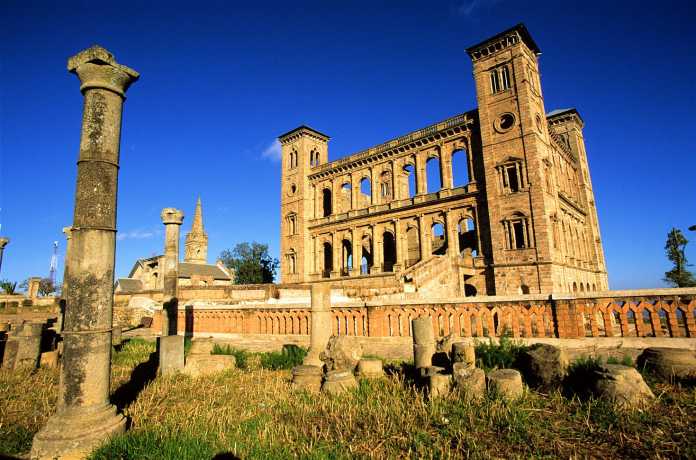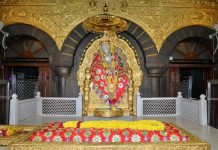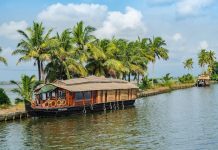Antananarivo, the tongue-twisting capital of Madagascar, is often overlooked by travellers, which is an opportunity missed. Yes, it’s a busy, ramshackle sort of place where traffic is a problem and security is taken seriously, but look beyond this, and you’ll find a colourful city full of charm, history and incredible views at every turn.
There are palaces, museums and streets lined with faded colonial architecture to explore, bustling markets and boutiques to peruse, and a contemporary dining scene to enjoy.
 The colours of Antananarivo on full display ©Qazi alfaz /Travelomama
The colours of Antananarivo on full display ©Qazi alfaz /Travelomama
Delve into the history of Antananarivo
As the home of the Merina, Madagascar’s largest and most powerful ethnic group, Tana (as it’s affectionately known) has featured heavily in the country’s evolution since its founding in the early 17th century. Its journey to become the capital of the first unified Kingdom of Madagascar in 1810 was an arduous one, with numerous tribal wars and the continual redrawing of boundaries. By the time the French arrived on the scene in 1897, Tananarive (as it was then known) had long been a major city. After independence in 1960, the city started to swell further, and the growing pains associated with its increasing population culminated in political unrest in 2009. It still faces huge challenges – corruption and the lingering political uncertainty – that continue to hold it back, much to the frustration of its people. Today, the city remains the seat of power, where international organisations, businesses and money mingle, making it unlike anywhere else in Madagascar. It stands out for its relative (if isolated) areas of wealth and cosmopolitan facilities, and is very much the heart of the action on the island.
 The main gate of the Rova of Antananarivo (aka the Queen’s Palace) © Qazi alfaz /Travelomama
The main gate of the Rova of Antananarivo (aka the Queen’s Palace) © Qazi alfaz /Travelomama
Historic sights
You couldn’t miss the 19th-century Rova of Antananarivo (palace complex) if you tried. Constructed at the city’s highest point, it towers above Antananarivo and stands in stark contrast to the more modest neighbourhoods that cling to the hillside below. Buildings at the Rova have come and gone since the early 1600s. Sadly, many of the original wooden structures that had survived from the 19th century were destroyed by a devastating fire in 1995. Thankfully, the imposing stone building, erected by Scottish missionary James Cameron in 1867, remains intact. Your (compulsory) guide will set the city in context and give a good introduction to Antananarivo’s history.

The story continues at the nearby Andafiavaratra Palace, where the small museum showcases select artefacts and paintings depicting Merina rule, many of which were rescued from the fire. You can then dig a little deeper at the Musée d’Art et d’Archéologie. This free museum details archaeological sites around Madagascar and showcases ancient finds.
Imported Christianity has played a significant role in shaping society, not only in Antananarivo but also in Madagascar as a whole. As such, churches are found all over the city – it’s said there are more than 5000 of varying persuasions, shapes and sizes. Stop by Andohalo Cathedral to see one of the leading Gothic-style places of worship.
Standing at the gates of the former French consulate, you’d be forgiven for forgetting where you were. This unmistakably French chateau was renamed Ambohitsorohitra Palace and is now used as official offices. You can’t enter, but it’s worth an eyeball on a walk through town.
A drive through the outskirts of northern Antananarivo will take you to the Royal Hill of Ambohimanga, the country’s only cultural Unesco site and a place of great significance. It includes the ruins of a fortified royal city as well as a burial site, and it remains an important place of pilgrimage for the people of Madagascar.

Sample the island’s finest cosmopolitan cuisine
Madagascar isn’t exactly known for its haute cuisine, yet Antananarivo stands in splendid isolation for its delectable selection of restaurants and vibrant dining scene – it’s a welcome surprise to many visitors. There’s a delicious blend of Madagascan hospitality and European flair, where French staples mingle with Indonesian and African flavours. The unexpected joys of baked camembert, creamy tartiflette and nasi goreng (Indonesian stir-fried rice with vegetables and meat) make eating out a pleasure, while dishes using local spices, such as vanilla chicken and zebu steak with Madagascan peppercorn, give you a taste of something more local. Antananarivo is, without doubt, a treat for foodies.
Start the day with breakfast and strong coffee at Café de la Gare, a vintage European affair, located by the tracks in Gare Soarano, the old railway station. Lunchtime calls for a stop at the bamboo-enveloped terrace of Le Buffet du Jardin for a crispy pizza and an ice cold THB (locally brewed ‘Three Horse Beer’).
Dinner offers the chance to sample even more of the capital’s gastronomy – go for authentic Spanish tapas on the terrace at the Grand Hotel Urban, the generous portions and lively atmosphere at Le Saka (book in advance!), or the zebu and raclette at La Ribaudiere. Not ready for bed? Pop by no comment bar for some live music and cocktails.

Shop the markets and artisan boutiques of Antananarivo
When it comes to shopping in Antananarivo, practicality and style trumps tourist tat. In place of imported magnets and plastic-fantastic ornaments is a sophisticated selection of locally produced handicrafts, textiles, oils and spices – if you know where to look. For an elbows-out experience head to Analakely Market to rake through piles of essentials from secondhand clothes to knock-off trainers. Meanwhile, Village Artisanal d’Andohalo on the edge of Jardin d’Andohalo sells a variety of crafts from woven table mats to jewellery.
Back in Antananarivo’s once-upon-a-time railway station, stylish French-owned boutique Ivahona is a real shopping highlight. It’s stocked with plenty of gifts and chic souvenirs including homewares, scented soaps (Madagascan vanilla, of course) clothing and accessories. Épicerie Fine La Ferme de Morarano is the place to purchase your Madagascan consumables. Whether you’re after organic ylang ylang oil, spices or beauty products, you’ll find it here.
Keep an eye out for ‘Gallery Open’ signs, as many independent studios and galleries, such as Roses & Baobab, can be found around Antananarivo selling local art and sculptures.

Take in exceptional views
Antananarivo sprawls over two main hillsides, which can make walking around the historic part of the city a bit of a challenge on the legs, but fear not, the repetitive thigh burn is worth it. From the Rova, the city’s sights are spread out in front of you, including pretty Lac Anosy, a WWI memorial, and the much-loved Mahamasina Stadium, where all sorts of public events are held. You also get a sense of how Antananarivo’s notorious traffic snakes its way through neighbourhoods, which give way to suburban rice paddies dotted with smoking kilns endlessly firing bricks.
A self-guided walking tour is the best way to get to grips with the main sights and promises rewarding glimpses in every direction. Head for the oh-so-French area of Haute-Ville, which demands exploration on foot thanks to its crumbling colonial architecture and multiple viewpoints.

Experience natural attractions
For next-level viewing pleasure, time your visit to Antananarivo with the colourful jacaranda season (typically late October into November). Jacaranda trees line many of the French-conceived boulevards across Tana, and seeing these beauties in bloom is a delight, adding bursts of purple to the city’s slopes, parks and streets.




